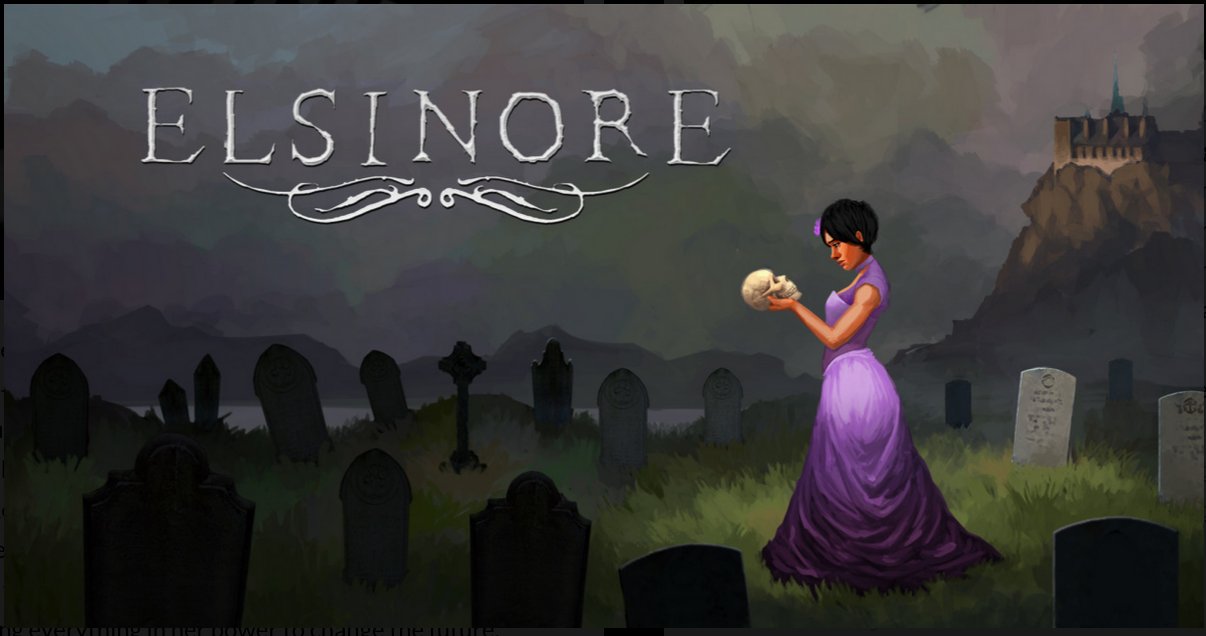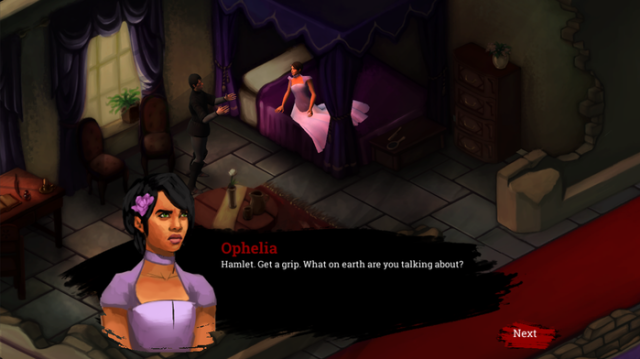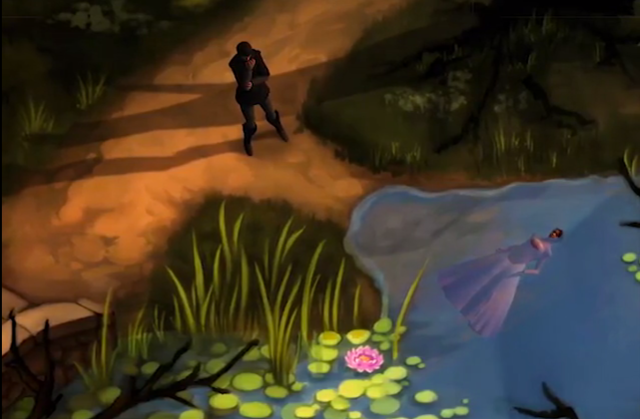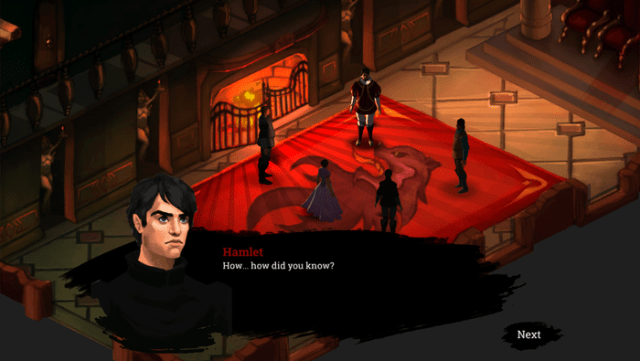The Mary Sue Interview: Katie Chironis and Connor Fallon on Elsinore
Shakespeare meets Majora's Mask/Groundhog Day? Take all my money, please.

At GDC back in March, The Mary Sue had a chance encounter with Elsinore‘s Connor Fallon and Val Reznitskaya at one of the myriad impromptu game lounges set up in San Francisco’s Moscone Center. We recently had a chance to chat with Fallon and Elsinore‘s team lead and writer, Katie Chironis about their now fully funded Kickstarter campaign for Elsinore.
Jessica Lachenal (TMS): I know we got to chat at GDC a little bit about it, but do you mind giving me a refresher on what Elsinore is?
Katie Chironis: Sure! So Elsinore is a time-looping Shakespearean adventure game. It’s basically a tragedy simulator. You play as Ophelia and you’re trying to stop the tragedy of Hamlet by manipulating characters to do things other than what they were planning to do. The way you do this is you gather bits of information by talking to one character and then using that to influence other characters.
Connor Fallon: The idea is that every time you play through, you’ll be trying to influence people in different ways. Most of the time, the way you influence them will result in some other horrific tragedy occurring rather than the one that you were starting out with. So, congrats, you’ve changed their fate to some other gruesome thing! But, often as a result of what you’ve done, you’ll learn something new. Each time you play, you get more and more tools to change people’s fates and alter the course of the events in the castle.
TMS: So what made y’all choose Hamlet?
KC: So, I read Hamlet for the first time in high school, and I was very drawn to Ophelia as a character, even then. I remember thinking that I didn’t really feel like she got a fair shot in the original play. She’s sort of this calm character, a very kind character, clearly very capable, she’s very patient. She puts up with a lot of bullshit from the other characters. And… then, she kills herself halfway through the play. I remember feeling as a kid that she deserved more than that.
I remember talking with Connor about how tragedy is doing everything you can to try and avoid fate, and frequently, you fail because of some inherent flaw in the characters that are part of the tragedy. So we talked about how if games are about the power of fantasy and all about winning, can we combine these two concepts into something really interesting.
TMS: Focusing on Ophelia, it seems like diversity is important to you guys, so what kind of role is that playing in your decision making here?
KC: Ophelia is interesting as a character because she’s gone for half the story–she kills herself halfway through the play–so that makes it really easy to remove her from the flow of what everyone else is doing. She can be a protagonist with sort of a meta influence. On top of that, people don’t notice her. She’s a woman in a time when it’s very difficult to be a woman. For that reason, people often dismissed her, or shove her to the side, or just ignore what she has to say. That makes her kind of like a spy, she can move around the castle undetected and unnoticed, and still have all this effect on people who don’t notice her because they take her for granted.
CF: She’s planting these ideas and having people think that they came up with the ideas themselves.
KC: Yeah, a lot of Elsinore is about subtlety so if you’re too blatant with a character or too forceful, like you tell Hamlet, ‘Hey, your uncle murdered your dad,’ he’s going to mentally go off a cliff. So its all about subtly changing these characters minds but also keeping them alive, because they are Shakespearean and they’re trending towards these awful, awful fates. She’s a good pick for subtle influence, I thought.
TMS: She uses her anonymity as an advantage, almost like a power or something.
KC & CF: Yeah, yeah. Exactly.
TMS: That’s kind of at odds with most games, where you have a character who kind of is forceful or who directly impacts the story, but here you’re trying to be more subtle.
CF: I mean, you can try to be forceful, but a lot of the things in the castle are so unstable that any dramatic action will throw things out of whack. To backtrack a little bit, that’s why Hamlet was such a good choice for this game, cause there’s so many things going on in the story. A lot of things just get this one line mention in the play, and it’s clear that there’s a bunch of political forces at play. It’s a vortex of pressures ready to snap.
TMS: What engine is Elsinore being built on? Is it something you’ve built yourselves?
KC: It’s being built in Unity. Eric [Butler] and Kristin [Siu], our two programmers, have done some amazing work hacking away at Unity to make basically a modified AI system. The characters are using modeled AI to model what they know and what they feel and think about other characters. But it’s all based on Unity.
TMS: Tell me about the game’s style. How did it come about?
CF: Early on, Katie and I were looking at a very watercolor type style, but when Wes[ley Martin] came on, we got several different options. I think the most out there one was one where the entire environment was a stage, so buildings would lift up and come back down as you walked around.
KC: We wanted something that conveyed that Ophelia was aware of what’s going on with the time loops, so that’s why we decided to go with this brushy, painterly style where you can see the physical brush strokes on the world, instead of something that’s fully immersive.
TMS: Kind of a topic change, but I noticed that on your Twitter, Katie, you mention that people had been calling this a “girl game”?
KC: Yeah, it’s mostly feedback from people who aren’t exactly in the gaming community, but a lot of people have come up to me (family friends, people that I know don’t play many games), and they’re like, ‘I’m so glad you’re making this game for girls, because we need more girly games out there,’ and I’m like uh, it’s not really a girly game.
TMS: So what’s your take on the whole idea or practice of gendering games?
KC: I think it’s stupid. We need more games not only with female protagonists, but also with protagonists who don’t identify as male or female, who are people of color, who are from a range of socioeconomic backgrounds. I would love to see more of that happening, and I sort of made a personal pledge with myself that I would never make another game again that has a white dude as the protagonist, like, sorry white dudes. I love you guys, but the world doesn’t need any more of those games. I’m quite happy that Ophelia has turned out to be this well-rounded, interesting, very compelling character.
CF: It’s worth nothing that with the Elsinore cast, we’ve been able to get a great deal of representation in our characters. I feel like it’s something the entire team has been on board with the entire time, from the start.
KC: We were actually lucky that we decided to host our website on Tumblr, and when we started posting a little bit about what we wanted to do with these characters, we found out there’s this massive Shakespeare fandom. They were all excited about how, oh, Ophelia is a woman of color, and totally weren’t like, worried about the ‘sanctity’ of their fiction. They were like, no way, bring it on! There’s actually an earlier version of Ophelia where we made her white, and we asked ourselves, ‘Does she have to be white?’ So, we decided, fuck it, Ophelia, you’re not white. We started looking at other characters in the same way, like, can we have Rosencrantz and Guildenstern be women of color instead of white, straight dudes?
CF: A lot of the characters aren’t described physically in the text. It’s just an assumption that a lot of the time, they’re either a white woman or a white man, and that’s just the default. Shakespeare didn’t specify. When we were doing research for the time period, there’s like, no reason why it has to be that as the default.
KC: It’s about coming to the table with an open mind and looking at someone’s personality and asking what kind of person could they be. What do we feel like they should be?
TMS: How much of a role does race play in the plot? Is it something that’s called out?
KC: It’s an iterative process, because on the one hand, as a white person, I want to be sensitive to these issues, and I don’t want to just charge in there and assume that I know what’s best and try to write these characters and be like, ‘Alright, I’m done.’ We definitely have talked with a lot of people of color who’ve given us a lot of really good insight on how to develop these characters. I don’t want to create this, like, complete fantasy world where we just never comment on the fact that Ophelia is black. That would almost be silly to ignore that variable because I think it’s important. I think it does have an impact on the story.
But at the same time, I feel like there’s so much fantasy racism and it’s overplayed. I understand a lot of people of color play games in order to get away from that, and they don’t want to be constantly confronted with it. It’s exhausting, especially given the current climate in the U.S. right now. We want to strike a nice chord between the two ideas, having it be an element, but not the only thing about these characters.
—–
Elsinore is now up on Kickstarter, and was fully funded within the first four days of the campaign.
—Please make note of The Mary Sue’s general comment policy.—
Do you follow The Mary Sue on Twitter, Facebook, Tumblr, Pinterest, & Google +?
Have a tip we should know? [email protected]



